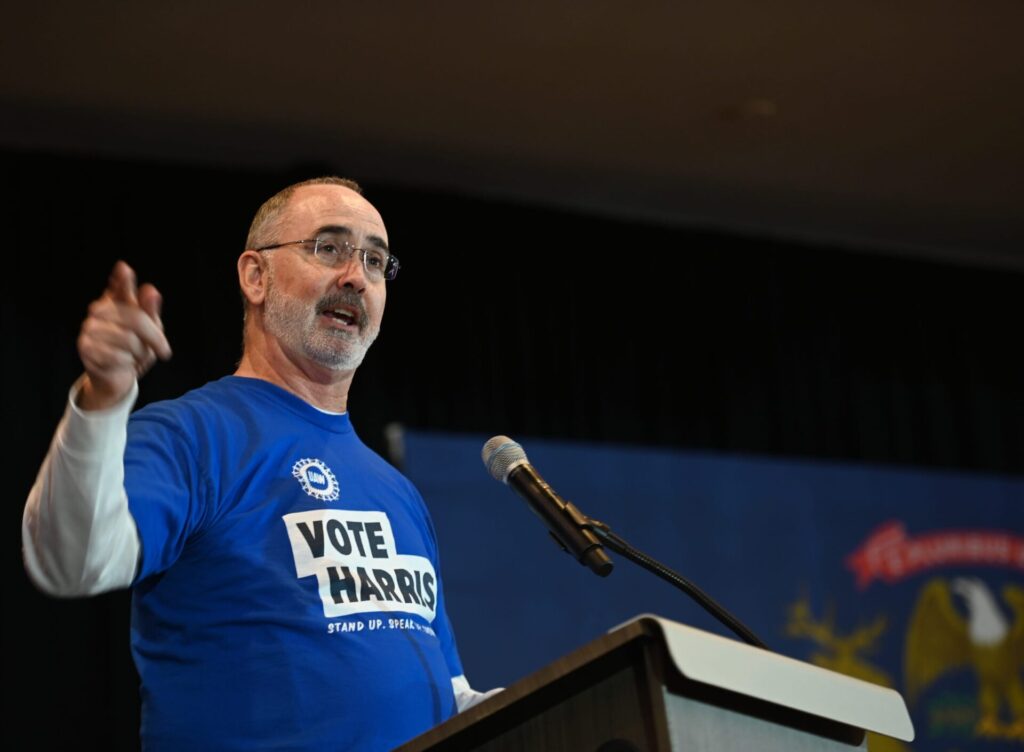Donald Trump’s tariff policy has sparked significant debate, with critics warning it could lead to job losses while supporters argue it could bring manufacturing back to American soil.
The question remains: will Trump’s tariffs harm workers? While some layoffs may be inevitable, many unions, including the United Auto Workers (UAW), are firmly behind the policy, seeing it as a necessary step to restore American manufacturing.
On Sunday morning, UAW President Shawn Fain appeared on CBS’s Face the Nation to discuss the potential benefits of Trump’s tariffs.
Elon Musk Called This Financial News ‘Terrifying’
Fain, who has had a complicated relationship with Trump—endorsing Kamala Harris despite knowing his rank-and-file supported the Donald Trump—now supports the tariff policy, pointing out that it could bring manufacturing jobs back to the U.S. from countries like Mexico.

In the interview, Fain explained that the auto industry has excess production capacity in the U.S. and that jobs could be returned quickly without the need to build new factories.
“Look, we have a situation right now in Warren, Michigan, where 2,000 workers were laid off this past year,” Fain told Major Garrett, referring to a decision by Stellantis, formerly Fiat Chrysler, to move production of the Ram truck to Mexico.
He emphasized that shifting the work back to Michigan could be done “in very short order,” putting those workers back on the job.
FREE Concealed Carry Gun Laws & Reciprocity Map
Fain also pointed to Volkswagen’s production in Mexico, which he said could be easily moved back to the U.S. if tariffs incentivize companies to act.
Fain further drew a historical parallel to World War II, noting how the U.S. mobilized its industrial base to win the war by converting auto manufacturing plants into military production facilities.
According to Fain, the same principle can be applied today, as American plants still have excess capacity that could be tapped into to bring jobs back home.
In discussing the relationship between tariffs and job creation, Fain said that tariffs act as a motivator for companies that have been “abusing the process” by shifting jobs to lower-wage countries.
He noted that the 1992 NAFTA agreement, which promised to keep manufacturing jobs in the U.S., ultimately led to the closure of 90,000 plants and the outsourcing of jobs to Mexico.
Now, Fain argued, the 20-25% tariffs on imports would force companies to reconsider sending production abroad.
Fain highlighted the immediate threat of plant closures, mentioning a Deere plant in Wisconsin and a truck plant in Pennsylvania that are at risk of moving production to Mexico.
He explained that while tariffs may not be a complete solution, they are an essential tool in forcing companies to prioritize U.S. workers and manufacturing.
“The tariffs are a tool in the toolbox. They’re not the end-all solution. We have to fix the broken trade system,” Fain said.
“But the way tariffs work, they’re a motivator, because there’s going to be a penalty for everything the companies ship in here.”
Trump’s tariffs are a key part of his “America First” agenda, promising to bring jobs back to the U.S. by making it more expensive for companies to outsource production.
Critics argue that some workers will lose their jobs in the short term as companies adjust, but Fain and other supporters view this as a necessary step toward revitalizing the American manufacturing sector.
While the policy may lead to some immediate pain, many see it as a long-term gain.
Trump’s promise to end the outsourcing of American jobs and restore the country’s manufacturing base is a central part of his economic agenda.
As Fain put it, “short-term pain for long-term gain,” signaling that the policy is intended as a negotiating tactic to fix the broken trade system.
Critics have argued that the timing of the tariff policy could have been better, especially after the passing of the budget reconciliation package, which extended Trump’s tax cuts and provided Americans with an economic boost.
However, the tariffs are not a surprise, as Trump had made his intentions clear long before he took office.
The question now is whether the U.S. can strike the right balance between short-term disruptions and long-term benefits.
As companies begin to assess the financial implications of tariffs, the real test will be whether they follow through on bringing jobs back to the U.S. or continue to prioritize lower-cost foreign labor.
The debate over tariffs is far from over, but one thing is clear: Trump’s trade policies will continue to shape the future of American manufacturing.
American Made Patriotic Apparel – Save 15% with Promo Code MERICA
The opinions expressed by contributors and/or content partners are their own and do not necessarily reflect the views of LifeZette. Contact us for guidelines on submitting your own commentary.

![Trump Lays It All Out at the DOJ [WATCH]](https://www.right2024.com/wp-content/uploads/2025/03/Trump-Lays-It-All-Out-at-the-DOJ-WATCH-750x375.jpg)





![‘We All Owe Him (Elon) a Huge Debt of Gratitude’ [WATCH]](https://www.right2024.com/wp-content/uploads/2025/03/‘We-All-Owe-Him-Elon-a-Huge-Debt-of-Gratitude-350x250.jpg)

![Trump's Admin Guts Another ‘Rogue Government Agency with Zero Accountability’ [WATCH]](https://www.right2024.com/wp-content/uploads/2025/03/Trumps-Admin-Guts-Another-‘Rogue-Government-Agency-with-Zero-Accountability-350x250.jpg)







